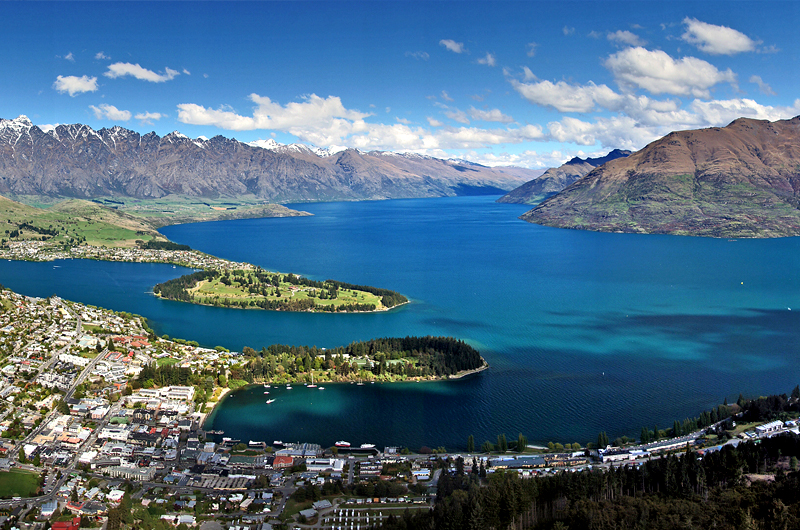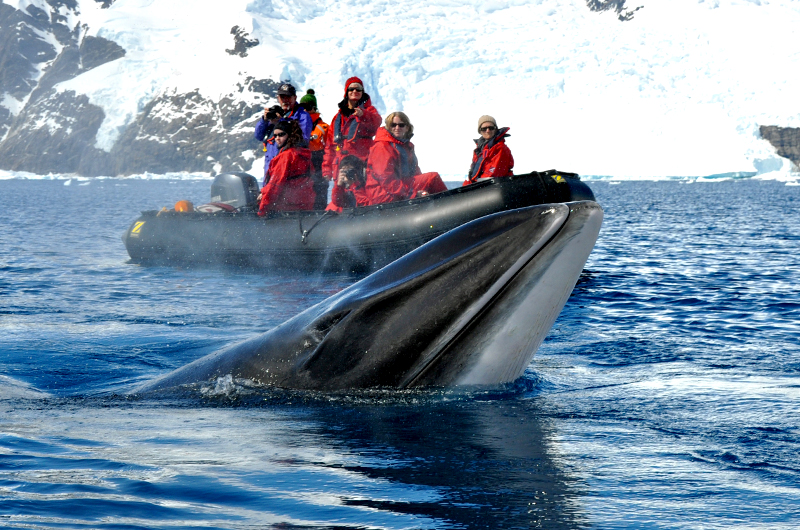
Students observe a whale – Antarctica
Antarctica: Human Impacts on a Fragile Environment
Study abroad in Antarctica with AUIP on this once in a lifetime opportunity, recently named the second-most “Bucket List-Worth Study Abroad Program by the Travel Channel.
Antarctica is a wondrous place, the “coldest, windiest, driest, highest, quietest, most remote, and least understood continent on earth.” It has been an object of human speculation for millennia and a prize for explorers, sealers and whalers, scientists, and geostrategists for more than two hundred years.
With no indigenous people, no permanent residents, and no economy of its own, Antarctica is a place simultaneously fragile to the effects of climate change and powerful in its vast frozen splendor.
A unique scenario of international relations, forty countries collaborate on scientific investigation at research centers in Antarctica, and the continent is protected by the Antarctic Treaty System, a global partnership which supports research and environmental preservation.
Echoing this shared effort, AUIP provide a consortium-style study abroad program partnering universities to travel together in field cohorts. This gives students the opportunity to explore the continent along with their peers from across the United States.
This two part program examines this unique corner of the world and provides a broad overview of its human and natural history. Special attention is given to Antarctica’s physical and ecological systems as well as human activity in the region, sustainable tourism, and use of south polar resources.
Fall semester online component
- Students attend weekly live-streamed online lectures and discussions
- Lectures are delivered by guest Antarctic experts around the world, many of which are affiliated with Gateway Antarctica in Christchurch, New Zealand
- US university professors manage assignments and readings for further academic preparation
Guest expert lecture topics include:
- History of Antarctic exploration
- Citizen science
- Glaciology and ice
- Geology
- Marine and terrestrial ecosystems
- Antarctic birds
- Ecotourism and sustainable business
- Technology in Antarctica
- Antarctic psychology
- Antarctic gateway cities and the Drake Passage
- The Antarctic Treaty System, territorial claims and environmental management

Winter break field expedition
The two-week field component in December and/or early January typically includes 2-3 days in Ushuaia learning about the natural and cultural systems of Tierra del Fuego and impact of tourism in this Antarctic ‘Gateway’ community.
Then, students depart across the Drake Passage by expedition ship for approximately 10 days on a voyage to the South Shetland Islands and Antarctic Peninsula. Students complete field course assignments specific to the university course, which have included seabird observation studies, documentation of iceberg abundance and glacial retreat, ecotourism surveys, and phytoplankton citizen science research in collaboration with the NASA-funded FjordPhyto project.
Sample Itinerary
Field course highlights:
- Get to know Ushuaia, an Antarctic gateway city, and how tourism has shaped it.
- Visit Tierra del Fuego National Park for walks, views, and the geographic and historic context of the region.
- Cross the Drake Passage, observing changes in birdlife and icebergs.
- From your expedition ship base, journey by Zodiac landing craft on day excursions to the ice and the South Shetland Islands and Antarctic Peninsula. Expect to see penguins, seals, whales, icebergs, and a vast, quiet white wilderness.
- Take the polar plunge challenge, a refreshing dip in Antarctic waters.
Eligibility and how to apply
The program is available to students who are currently enrolled in a US university. Virginia Tech, Arizona State, Texas A&M and Washington State students apply directly through their home university. Students from other US colleges and universities are invited to apply through the University of Denver or Arizona State as non-degree-seeking students. Application deadlines are typically in January or February for the following winter voyage.
Students wishing to apply through the University of Denver should email both the faculty leader, Erika Trigoso Rubio ([email protected]) and the University Academic Programs office ([email protected]) to express interest and request further application instructions. For Arizona State the study abroad advisor contact information is included on the program page.
For more information and to receive occasional email updates, sign up to the mailing list below.
Media highlights
- No place like Antarctica: Students take study abroad trip of a lifetime – Penn State University
- Aggies take first study abroad trip to Antarctica – Texas A&M Today
- Texas A&M Antarctica program featured of “Degrees of Science”
- AUIP Antarctica program featured on NASA’s Explore blog
- Sun Devils on the Frozen Continent – ASU News
- The Antarctica Journals – VT News
- Students study abroad in Antarctica – VT News
Video credit: Virginia Tech’s Department of Geography
Prospective university partners
We welcome interested faculty and staff to contact AUIP if you would like to consider bringing a faculty-led university student group to Antarctica.
The AUIP Antarctica program kickstarted me on a journey of self-discovery and growth that brought me back to work professionally in Antarctica years later. It was a life-changing experience that I recommend to any student.”
Kimberly Kenny, Oregon State University, Antarctica program alumni
You will never feel more insignificant than when traveling to Antarctica. Having the opportunity to study and experience the exquisite environment was something I will value and reflect upon for the rest of my life…. Going on this trip is one of the best things I have ever done.”
Antarctica program alumni
Students
Study in Antarctica
Visit the silent white wilderness punctuated by icebergs and scattered with penguin colonies and pods of whales.
Ready to take the polar plunge and find out more?
Antarctica video
Antarctica gallery
Tips from Alumni
AUIP DESTINATIONS:
NEW ZEALAND

An isolated island nation in its evolutionary infancy, New Zealand is the most recently inhabited country in the world
AUSTRALIA

Australia is one of the most diverse countries on Earth, both in terms of its landscapes and its multicultural population















